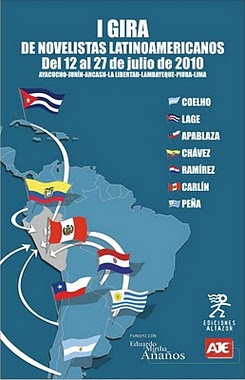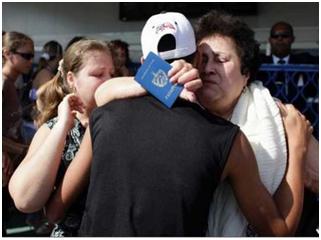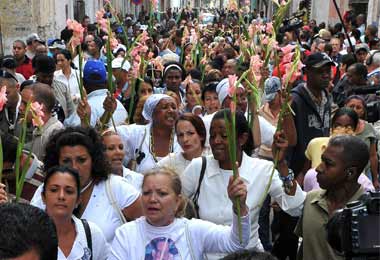
I don’t think it’s risky to say, if we confine ourselves to the most recent events, that the Catholic Church, the principle institution within the Christian doctrine, is now living through one of the greatest crises it has experienced since its beginnings. Above all, a crisis that goes beyond the skepticism of some of its followers to the heart of the institution. The worst of it is, clearly, a crisis of faith that could spread, dangerously, across the whole of Christianity.
Events have happened, one after another. Some, in the form of literary scandals such as occasioned by the publication of the DaVinci Code, by Dan Brown. Others, featuring well-known names in the Church: from a prominent priest in Miami Beach photographed with his lover, and who later changed his religious order, to the amnesic German priest who doubts that the Nazis really martyred millions of Jews in the extermination camps.
Later, the harsh debates about whether or not priests of the Protestant religions were admissible, and finally the real scandal. With an impact of significant proportions, it involves several priests in the corruption of minors, and even reaches to the Holy Father as supposedly covering up events of this nature.
With this as a backdrop, after seeing the highly publicized film, The Book of Eli, I find it hard to discard the idea that it comes to fulfill a goal far from artistic and aesthetic precepts, and that its premier in this is tightly linked to the era that Christianity is living through today.
It did no favors to Denzel Washington’s acting career to star in this Hughes Brothers production. And not because the film is like an ashamed ostrich sticking its head in the sand. After all, cinematically speaking, it has virtues that, without going to extremes, are still tangible: competent photography, and a dramatic thread that easily captures the viewer’s attention. However, for an actor of his proven stature, he seemed comfortable in a project that in my judgment was more like an inconsequential tract, and what’s worse, came off in the crudest imaginable way.
A quick summary of the plot: In a distant and imprecise future, the planet suffers a devastating war that does away with the greater part of our material heritage. In this context, a chosen one will lead a legendary trek to save from oblivion, and reprint for posterity, a book without which humanity cannot recover. Let us say the obvious: it’s the Holy Bible.
Fine. So what, in my view, are the most questionable elements, the most inadmissible from a rational point of view? The subliminal traps (at times they aren’t even subliminal but obvious) that the Book of Eli tends to provide in a movie, to those who aren’t thinking much beyond art or entertainment.
For example: Eli as played by Denzel Washington faces ten, fifteen, twenty armed enemies with guns, machetes and chainsaws. They don’t even touch him. The bullets, fired from five years by expert marksmen, whistle over his shoulders and disappear in the distance. At some point, if the viewer hasn’t figured it out, one of the characters takes the trouble to say: It’s because he’s protected in some way. It’s as if no one can touch him.
What is the source of the strength, the superiority, the supernatural condition of this man whom his enemies can’t bring down? The book that he carries in his bag. The book that he manages to memorize and that he can recite with visionary ease.
However, the sense of manipulation reaches its limit when, once in San Francisco where they survive a catastrophe, Eli and Solara, his female partner in the adventure, access the site from which humans seek to rebuild the lost world. What do they find there, rescued from destruction, as the only indispensable things required to rebuild the foundations of our species? Shakespeare and Mozart. The Encyclopedia Britannica, Wagner, and, after Eli’s feat, the Holy Bible.
That is, only the West. If in some waiting bunker there are samples from other cultures that currently populate the planet; if it had sheltered a copy of the Ramayana or the Buddhist sutras, a page from Confucius, or a fragment of Egyptian hieroglyphics, the scriptwriters of this movie did not think it important to point it out. Or, effectively, they don’t exist. They were extinguished in a war in which evidently they did not emerge victorious, or it wasn’t possible (or necessary) to save them.
What the forewarned viewer has to wonder, inevitably, is: Why, in order to rebuild our plural, beautiful and vast realm, is one culture and one religion necessary, without taking into account any of the others that possess just as many faithful and representatives?
Damaging, very damaging this precept. I believe that no approach has been more harmful to humanity throughout its History than the imposition of one faith above all others, the alleged superiority of one religion, one culture, over all the rest.
Or who can reproach the Islamic fanatic who in the name of his beliefs assumes it is just to explode an airplane mid-flight, just because westerners are infidels and Allah demands that they pay for their blasphemy with their blood? How can one preach equality, respect for all beliefs, even if you don’t share them, if a kind of cultural and religious self-sufficiency leads us to express messages like those in The Book of Eli plants in its viewers’ minds?
Moreover, this film is also a disservice to the message of love, tolerance and nonviolence that Jesus immortalized through his disciples. I don’t believe that a true follower of biblical doctrines could commune with the idea of a chosen one to whom the holy voice dictates what to do, and who, on his way, destroys hands and throats with a knife of fear, and crushes with bloody fury every enemy on his path.
Come on, in once case we have Jesus energetically expelling the money lenders who profane the temple, and in the other a character who wreaks human carnage while marching for the salvation of one doctrine.
No, I cannot approve of a manipulative and disturbing film like The Book of Eli, pretending to spread a vital message. Nor do I believe that an honest Christian, who defends love as a practice essential to safeguarding the soul, and tolerance as the ticket to social equilibrium, could approve it either.
Behind the salvation of a book, the supposed reconstruction of our beloved planet, the Hughes Brothers propose with their film a view of exclusion, of irreverence for the Great Cultural Universe, as dangerous as the most fiery threat of a fanatic of the Holy Wars.
 In his fourth opportunity to take advantage of the traditional date of July 26 to launch at least one sign of change, Raul Castro declined the privilege of addressing the most important event of the year, delegating the honor to the political leader who personifies intransigence: José Ramón Machado Ventura.
In his fourth opportunity to take advantage of the traditional date of July 26 to launch at least one sign of change, Raul Castro declined the privilege of addressing the most important event of the year, delegating the honor to the political leader who personifies intransigence: José Ramón Machado Ventura.





 Recently the Archbishop of Havana announced the release of 52 political prisoners over the course of three to four months. A rather strange act, this being a secular state. In turn, Miguel Angel Moratinos, Spain’s Minister of Foreign Affairs, told reporters that those released will travel to his country, and once they are out of Cuba, they will require government authorization to return, while their family members may do so whenever they wish.
Recently the Archbishop of Havana announced the release of 52 political prisoners over the course of three to four months. A rather strange act, this being a secular state. In turn, Miguel Angel Moratinos, Spain’s Minister of Foreign Affairs, told reporters that those released will travel to his country, and once they are out of Cuba, they will require government authorization to return, while their family members may do so whenever they wish.

